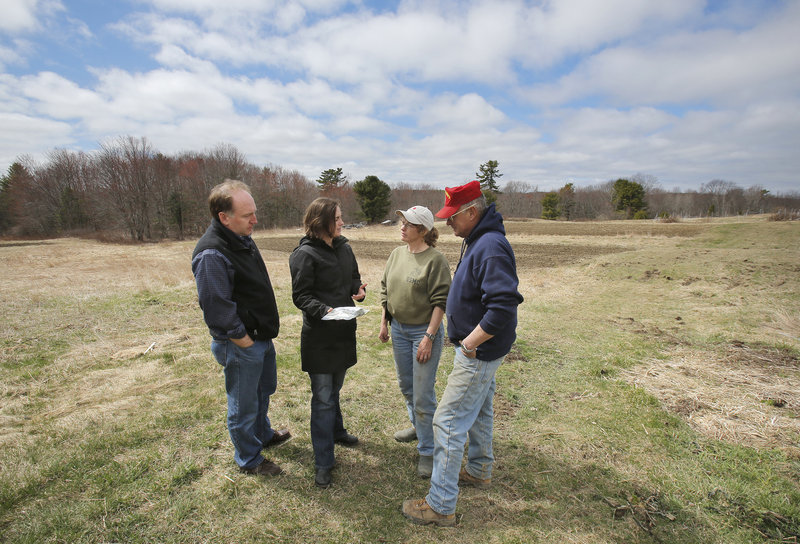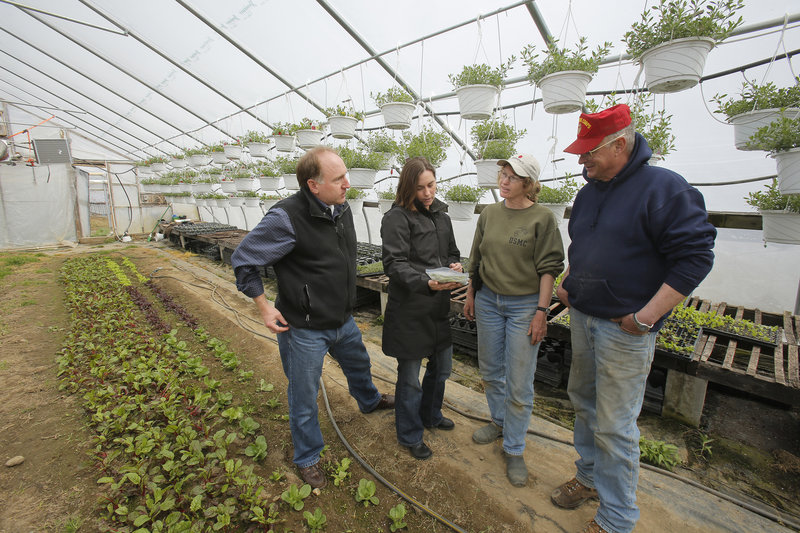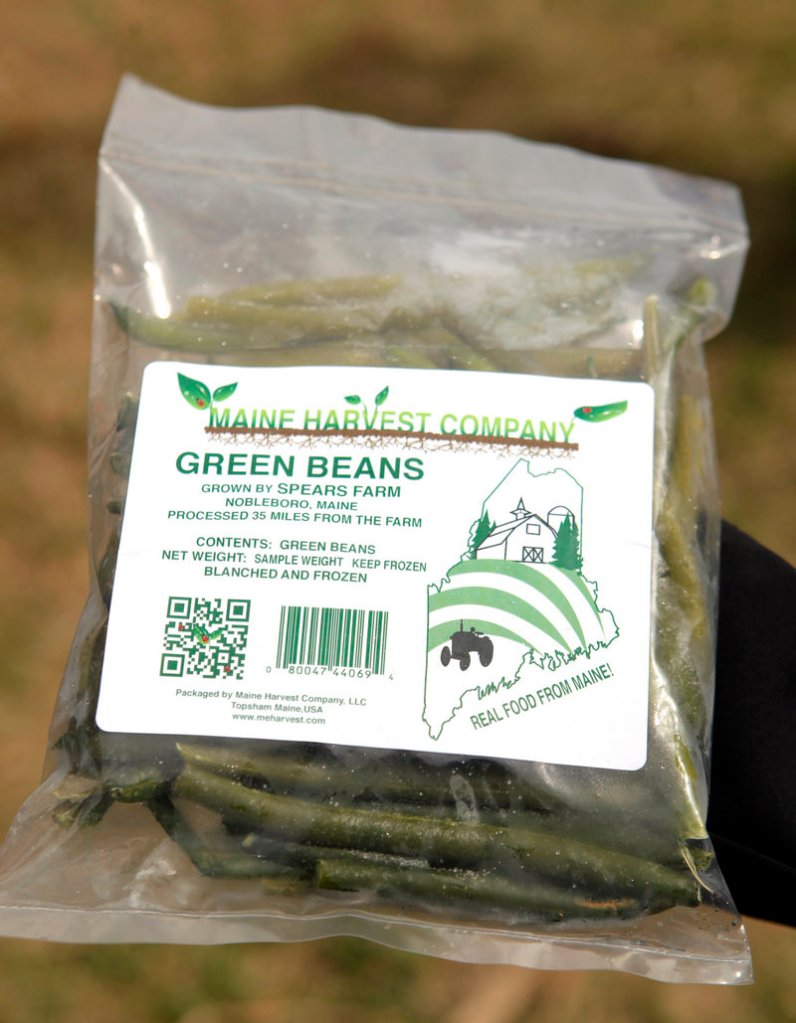TOPSHAM – It’s still spring, and ripe tomatoes are not yet even a glimmer in Mother Nature’s eye, but Pete and Kathy Karonis are already thinking about what they’re going to do with their tomato harvest from Fairwinds Farm.
They would like to freeze some of their harvest, Kathy Karonis tells Jamien Richardson of the Maine Harvest Co. during a meeting at the farm, but “I’ve been looking for some frozen tomatoes, and I can’t find any.”
Richardson tells the couple there are pureed tomatoes on the market, but right now there are no local food processors freezing them whole. That will change when Richardson’s new venture, a light processing facility for Maine-grown fruits and vegetables, launches this summer in the former Navy Commissary located in Topsham Commerce Park.
“We’re going to do three kinds” of tomatoes, Richardson explained to the Karonis. “We have potential to do whole frozen and whole green (tomatoes), and we’re also going to do crushed and pureed. We’ve been asked to do crushed and pureed, both with seeds and without seeds, and so we’re going to do some experimenting about that. A lot of the high-end Italian restaurants want tomato puree with no seeds, and that’s a base for pretty much everything they make.”
After years sitting empty, the Navy Commissary is being purchased by Hilary Rockett, owner of JHR Development, and Maine Harvest Co. (MHC) will be the building’s first tenant. The hope is that the 12,000-square-foot food processing facility will be the first step in turning the entire area into a local “food hub” filled with bakeries, breweries, coffee roasters or other related small businesses.
Rockett, who also developed Brunswick Station, sees such potential in the project he is also seeking an option on the entire 12-acre Topsham Commerce Park, formerly known as “The Triangle.”
CONSUMER-FRIENDLY
This isn’t just a good deal for the developer. Later this year, consumers will be able to find refrigerated or frozen local produce from this year’s harvest in small natural food markets.
Each MHC package will have a label that spells out the origin of the product. An example: “Grown by Spears Farm/Nobleboro, Maine/Processed 35 miles from the farm.”
For farmers, the project opens up new markets for their crops, as well as new ideas for how to use them.
“It provides us, the farmer, an opportunity to market some of our seasonal produce throughout the whole season,” Pete Karonis said. “The green beans, the strawberries, the tomatoes, broccoli, those kinds of things — we can now market them in a fresh-frozen state to our winter farmers market customers. We find that the winter farmers markets are very profitable for us. We think that’s providing us another opportunity for us to sell something really good to local consumers.”
Karonis said he anticipates selling 10,000 pounds of plum tomatoes to MHC this year.
Selling to Maine Harvest will also save the Karonises time. The couple harvests 10 acres of strawberries every year, and have been freezing them (along with some raspberries) themselves the past couple of years to sell at the winter farmers’ market.
“We like this process better,” Kathy Karonis said. “We’re interested in just sending them down to the Maine Harvest Co. and having them just freeze them up for us. We just don’t have time during strawberry season, and we can’t do it the way they do it. We don’t have the machinery.”
Richardson and her business partner, Tod Yankee, also plan to market Maine produce to schools, hospitals, large hotels and other institutions. (The Karonises sold several thousand pounds of fresh and frozen strawberries to the Portland school district last year.)
The produce that goes to budget-conscious institutional kitchens can be sold at a lower cost because it’s not first quality. Every year, farmers have some green beans, for example, that are a bit blemished or misshapen, but not rotten or decayed. They’ve simply lost their eye appeal to the consumer, who is always searching for perfection. These veggies typically end up in compost or as pig food.
Richardson and Yankee want to take those less-than-perfect beans and cut them into shorts or French them.
They’ll capture the normally lost value of not-so-perfect strawberries by turning them into strawberry smoothie mix for school lunch programs, college dining facilities, hotels and other large institutional kitchens.
Richardson and Yankee have about 30 farms interested in selling to them, and 12 have already signed letters of intent to provide fruits and vegetables for the company’s first season.
“We want to do 500,000 pounds this year, working up to 1.3 million by year three,” Richardson said.
They’ll begin in July and August with green beans, tomatoes and edamame, and transition to squash and pumpkin in the fall.
SPANNING SIX COUNTIES
Eventually, MHC hopes to do business with farms in six counties — Cumberland, York, Sagadahoc, Androscoggin, Kennebec and Lincoln.
The company doesn’t anticipate having its own equipment in place until September, so for the summer they are working out an arrangement with Northern Girl, a similar business in Aroostook County, to take their produce. That way, they won’t miss the entire growing season.
Richardson says she and Yankee have no interest in competing with Northern Girl, which processes mostly root vegetables and broccoli. On the contrary, they would like to be able to do things like send Northern Girl its surplus crops for processing, and vice versa.
“We don’t want to put other people out of business,” she said. “We want to create opportunity where it was not there before, and establish an industry working group within the state of Maine where we can share best practices and we can share equipment.”
Christopher Hallweaver, general manager of Northern Girl, said that if Maine is serious about making local foods more available, it will need dozens of similar value-added food processors around the state.
“If we’re going to feed Maine local food,” he said, “then we need lots of Northern Girls. We need lots of Maine Harvests.”
Mark Lapping, a distinguished university professor at the Muskie School of Public Service who is an expert in food-systems planning and policy, said this kind of arrangement where food processors share facilities has been happening a lot in Vermont. He says the idea of it happening here in Maine is “exciting.”
“This is really smart stuff,” he said.
There are almost 500 commercial food processors in the state, Lapping said, which sounds like a lot, but most of them are home processors.
“The number sounds pretty robust, but in fact they tend to be small, and that’s because we’ve seen over the years an erosion of processing infrastructure in the state,” Lapping said.
That means Maine is losing the jobs and money that these facilities bring with them.
MHC anticipates hiring five or six full-time employees and eight to 12 seasonal workers to start.
“The town’s very interested in seeing this,” said John Shattuck, development director for the town of Topsham, who said he is “wicked excited” about MHC’s potential to be a “significant economic development driver” in the community.
Shattuck said food-processing jobs tend to pay better than the typical job in the agricultural sector. And he sees the region’s farms as an untapped economic resource, partly because local farmers currently have few options for marketing their products.
“Getting into some of the more productive farmers markets is like trying to get a cab medallion in New York,” Shattuck said. “There are limited spots.”
Shattuck said consumers are generally much more interested in food now than they used to be, and scary news stories about recalls have made them think more about where the products they put in their grocery baskets originated.
“They’re starting to think a little bit more about where they’re getting their food,” Shattuck said. “Whether they think of themselves as being hip or ‘buy local’ foodie people or not, this is a real concern. Then you add onto that the energy component. It’s getting to be less and less tenable to ship this stuff long distances from the Southern Hemisphere, from coast to coast.”
Staff Writer Meredith Goad can be contacted at 791-6332 or at mgoad@pressherald.com
Twitter: MeredithGoad
Send questions/comments to the editors.






Success. Please wait for the page to reload. If the page does not reload within 5 seconds, please refresh the page.
Enter your email and password to access comments.
Hi, to comment on stories you must . This profile is in addition to your subscription and website login.
Already have a commenting profile? .
Invalid username/password.
Please check your email to confirm and complete your registration.
Only subscribers are eligible to post comments. Please subscribe or login first for digital access. Here’s why.
Use the form below to reset your password. When you've submitted your account email, we will send an email with a reset code.